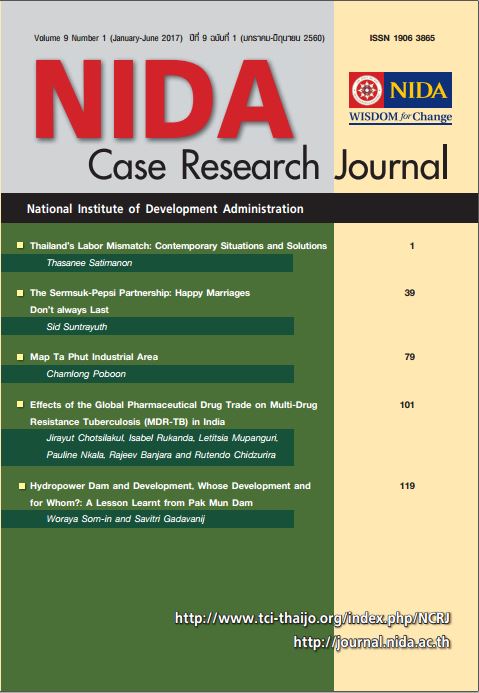The Sermsuk-Pepsi Partnership: Happy Marriages Don’t Always Last
Keywords:
PepsiCo Versus Sermsuk, Inter-Cultural Communication, Business Negotiation, International Business Deal, เป๊ปซี่โคและเสริมสุข, การสื่อสารต่างวัฒนธรรม, การเจรจาต่อรองธุรกิจ, การตกลงธุรกิจระหว่างประเทศAbstract
In April 2011, the Thai and U.S. business presses were awash in the news that one of the longest-running and most successful business partnerships between the U.S.-based conglomerate, PepsiCo, and its Thai bottler and distributor, Sermsuk Pcl (“Sermsuk”) had just been announced as slated for termination, effective April 1, 2012. Many observers within the soft drinks industry in both countries were stunned. Not only had the relationship endured for nearly 60 years, but it had been a highly profitable one for both parties. Moreover, under Sermsuk’s marketing and distribution acumen, Thailand had emerged to become one of the few national markets in which PepsiCo’s market share exceeded that of its arch-rival, Coca Cola (bangkokbiznews.com). Observers were left puzzled, as few would have predicted that such a long-established and successful partnership would eventually end in mutual, albeit muted, acrimony with each side blaming the other for the divorce. Hence, the business communities in the metropoles of both nations were keenly interested to know the causes of the ruptured relationship, in case it might contain useful lessons for their own increasingly globalized operations.
บทคัดย่อ
ในเดือนเมษายน 2011 สื่อต่างๆ ได้รับข่าวที่น่าตกใจเกี่ยวกับการแยกทางกันระหว่างสองธุรกิจที่มีความร่วมมือกันมายาวนานและประสบความสำเร็จที่สุดระหว่างเป๊ปซี่โคบริษัทในเครือของสัญชาติอเมริกันและผู้จัดจำหน่ายในประเทศไทย บริษัท เสริมสุข จำกัด มหาชน (เสริมสุข) ทั้งสองบริษัทได้มีการประกาศยกเลิกสัญญาที่ทำมาร่วมกันมานาน โดยผลบังคับใช้วันที่ 1 เมษายน 2012 ซึ่งบรรดานักลงทุนและผู้ติดตามข่าวทั้งหลายถึงกับต้องตะลึง เนื่องจากทั้งสองไม่เพียงมีความสัมพันธ์มานานเกือบ 60 ปี แต่ทั้งสองก็มีผลกำไรที่ดีอย่างเสมอมาด้วย นอกจากนี้ การดำเนินการทางตลาดและจัดจำหน่ายภายใต้เสริมสุขก็ทำให้เป๊ปซี่มีส่วนแบ่งการตลาดที่เหนือกว่าโคคา โคล่า ซึ่งประเทศไทยเป็นเพียงไม่กี่ประเทศเท่านั้นที่สามารถทำได้เช่นนี้ (bangkokbiznews.com) บรรดานักลงทุนและผู้ติดตามข่าวต่างต้องฉงน เนื่องจากคงไม่มีใครที่จะคิดว่าความสัมพันธ์ที่ยาวนานระหว่างสองธุรกิจนั้นจะจบลงได้ง่ายๆ และต่างฝ่ายก็กลับโทษกันในการยกเลิกความสัมพันธ์ในครั้งนี้เปรียบได้เสมือนการหย่าร้างของสามี ภรรยาที่ลงเอยไม่ดี กรณีศึกษานี้จะเป็นตัวอย่างที่น่าศึกษาในมุมมองของธุรกิจจากทั้งสองประเทศว่าปัจจัยใดนั้นทำให้ความสัมพันธ์ที่มีมานร้าวราน อีกทั้งกรณีศึกษานี้ยังจะเป็นบทเรียนที่สำคัญแก่ธุรกิจในยุคโลกาภิวัตน์นี้ด้วย





